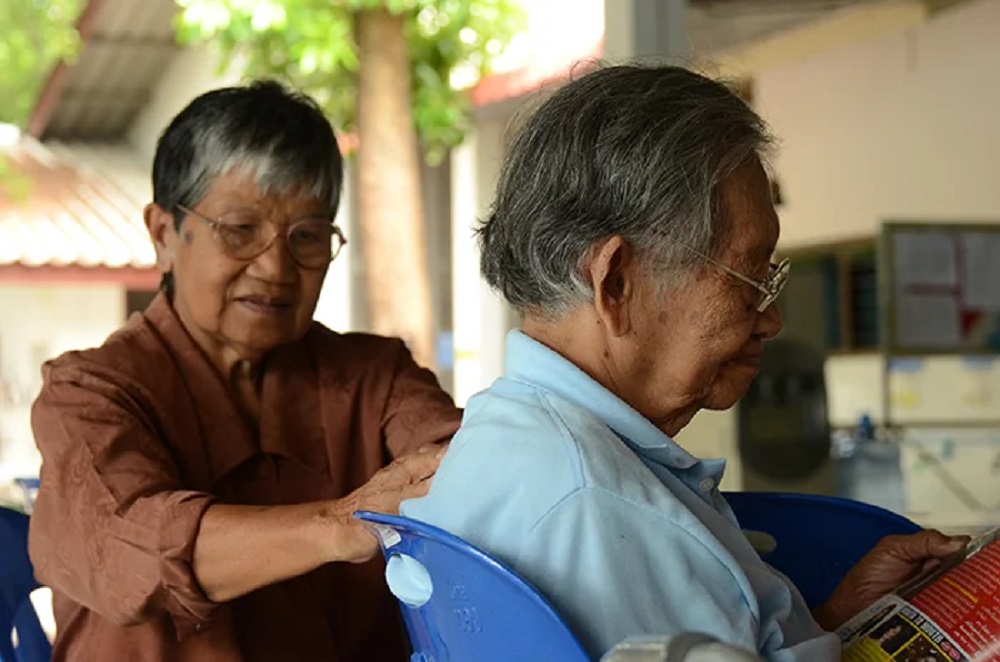Critics have lambasted the outgoing Prayut government for introducing a new policy placing income limits on the elderly receiving monthly pensions from the Government of Thailand.
They argue that the next government should make the decision, while criticising the departing government of inefficiently categorising income groups. The new legislation was signed by Interior Minister Anupong Paojinda on Friday, was published in the Royal Gazette, and went into effect on Saturday.
The previous regulation required local government agencies to give universal monthly pensions of 600-1,000 baht to all senior persons, with 600 baht for those aged 60-69, 700 baht for those aged 70-79, 800 baht for those aged 80-89, and 1,000 baht for those aged 90 and more.
Item 6 (4) of the new regulation specifies that as of Saturday, only old persons with no or inadequate income to pay the cost of living are eligible for the state’s monthly pension allowance.
Item 17, a provisional clause in the new regulation, specifies that the new criterion for payment of the elderly allowance does not apply to those who registered for the stipend with local organisations before August 12, 2023, implying that those who are presently receiving the allowance are unaffected.
The Move Forward Party (MFP) secretary-general, Chaithawat Tulathon, stated that the party opposes the new criterion.
“Everyone is eligible for welfare benefits.” It is not about attempting to demonstrate people’s poverty. Changing a policy involving welfare benefits is a significant issue since it impacts a large number of individuals. “It should not be carried out while a new government is still in place,” he stated.
“Whoever becomes the next Prime Minister should revise the new regulation,” Mr Chaithawat added, emphasising the party’s support for universal welfare coverage.
MP Wiroj Lakkhanaadisorn stated that the new criterion has superseded universal pension coverage for the elderly.
It will have a significant impact on those reaching the age of 60 in the future, he claims. People turning 70, 80, or 90 who are looking forward to a bigger allowance may wonder if they will receive it.
Furthermore, he stated that it is unclear if persons turning 60 who have enough money to live on but are not eligible for the pension under the new criterion and later discover they are unable to make ends meet will be able to register for the allowance.
According to Mr Wiroj, Thailand presently has approximately 11 million people aged 60 and up. Only 5 million people would be eligible for the elderly stipend if payments were based on the database of state-welfare cards.
He claimed that the government will abandon the remaining 6 million people.
“The database is untrustworthy.” “This information cannot be used as a criterion for determining eligibility for the elderly allowance,” he stated. According to the MFP MP, Section 11 (11) of the Elderly People Act requires that the elderly allowance be paid monthly and be universal and equitable.
The demand that the elderly demonstrate their poverty may prohibit them from receiving state assistance, which violates the law.
People affected by the change, according to Mr Wiroj, can file a petition with the Administrative Court. During the general election campaign, the MFP promised a monthly allowance of 3,000 baht to all senior residents.
According to Sustarum Thammaboosadee, a lecturer at Thammasat University’s college of interdisciplinary studies, all old people should have access to universal welfare coverage.
Wannaphong Durongkaveroj, a Ramkhamhaeng University economics expert, stated that local authorities could not rely on the state-welfare card database to determine who is qualified for the payment.
He stated that instead, they must conduct local surveys before implementing the new regulation.
Elitism in Thailand is a societal structure where a small, privileged and powerful group holds disproportionate influence and control over various aspects of the country, including politics, economy, and culture. This concept has been a significant and enduring feature of Thai society for many decades.
Key points about elitism in Thailand include:
- Monarchy and Aristocracy: Historically, Thailand had a hierarchical society with a monarchy at the top, followed by a noble and aristocratic class. This hierarchy has significantly influenced the country’s power dynamics and social structure.
- Political Elites: In modern times, Thailand has experienced numerous military coups and political upheavals. A pattern emerged where the military, bureaucratic, and business elites held significant sway over the political landscape. Political parties often had close connections with these elites.
- Economic Inequality: Economic inequality has been a major issue in Thailand, with a large gap between the rich and poor. The country’s economy has been dominated by a few wealthy families and business conglomerates that wield considerable influence over economic policies and regulations.
- Education and Opportunity: Access to quality education and opportunities has been skewed in favor of those from privileged backgrounds. The elite families often send their children to prestigious schools and universities, granting them advantages in both the public and private sectors.
- Media and Information Control: Elitism extends to media ownership, where a few conglomerates control much of the mainstream media. This can lead to biased reporting and limited diversity of perspectives in the media landscape.
- Social Strata: The Thai society is often divided into different strata, with those from the rural areas and lower socioeconomic backgrounds having limited access to resources and opportunities compared to the urban and well-connected elites.
- Resistance and Social Movements: Over the years, there have been movements and protests by various segments of Thai society, particularly students and youth, against the entrenched elitist structure and the concentration of power.
It’s important to note that discussions around elitism in Thailand can be sensitive due to the country’s political landscape and legal regulations regarding discussions about the monarchy. Public perceptions and discussions can vary widely, and viewpoints might be influenced by political affiliations and personal experiences.









